- Home
- Jason McIntyre
Fled (Dovetail Cove, 1973) (Dovetail Cove Series)
Fled (Dovetail Cove, 1973) (Dovetail Cove Series) Read online
Fled
a novella by
Jason McIntyre
Published by &
Copyright © 2017 Jason McIntyre
All rights reserved. Without limiting the rights under copyright reserved above, no part of this publication may be reproduced, stored in or introduced into a retrieval system, or transmitted, in any form, or by any means (electronic, mechanical, photocopying, recording, or otherwise) without the prior written permission of both the copyright owner and the above publisher of this book. Thank you for respecting the work of this author.
Fiction titles by Jason McIntyre
On The Gathering Storm
Thalo Blue
Walkout
Mercy and the Cat
Black Light of Day: A Collection
Nights Gone By: A Collection
The Night Walk Men: A Novella
The Devil’s Right Hand: A Night Walk Men Novel
Corinthian: A Night Walk Men Story
Kro: A Night Walk Men Story
Dovetail Cove titles by Jason McIntyre
1. Deathbed (Dovetail Cove, 1971)
2. Bled (Dovetail Cove, 1972)
3. Fled (Dovetail Cove, 1973)
4. Redhead (Dovetail Cove, 1974)
5. Zed (Dovetail Cove, 1975)
6. Unwed (Dovetail Cove, 1976)
7. Shed (Dovetail Cove, 1977)
8. Dread (Dovetail Cove, 1978)
- 9. [COMING SOON] (Dovetail Cove, 1979) -
- 10. [COMING SOON] (Dovetail Cove, 1980) -
Learn more about the author and his work at:
www.theFarthestReaches.com
Dovetail Cove
May 1, 1973
Part I
Wed
“Men are more moral than they think and far more immoral than they can imagine.” ― Sigmund Freud
1.
The first time Charlie Scobie witnessed the icy, black hand of death, he was five years old.
It was the second week of November, 1949. A Tuesday. The sun was barely up. Little Charlie was walking up the #94 side lane to meet the bus at Lucky Boy Road, just north of Blue River, Oregon. He was a half-dozen paces behind his big brother, Kelly. Breath clouds formed and dissipated at their mouths. Formed and dissipated, formed and dissipated. His rusted blue lunch pail swung jauntily in his mitten and he plopped along dreamily, having woken up late and still feeling crust in the corners of his eyes but not giving that any thought.
Kelly was eight—old enough to start shooting birds with his Dad and uncles—and he spotted it first. At the point up ahead where the brush met the shoulder of the bumpy, sanded road, a bedraggled overhang of leaves in orange and yellow drooped lazily over the frosted grit and nearly kissed a dark, misshapen blob. Kelly put out the tip-toe of his boot and made the dark shadow of his crooked leg long on the road and into the side-bush.
“Hey, Charlie, come ’ere and take a look!” He dabbed his foot again at the dark spot. The dark spot didn’t recoil from his jab. It shifted, but only a little. It was a crisp morning and everything wore a layer of white crystal from last night’s frost.
Charlie picked up his pace. His rucksack bobbed and the handle in his mitt squeaked against the tin of his blue pail. He joined his brother and stuck to a stop in the grit, nearly tumbling forward and right into the dark patch that held his big brother so rapt.
“What is it?” Charlie asked, inching back.
“Don’t touch it, Charlie. Dad’ll hide us both. Just do your gawking and then come on. We can’t miss the bus.”
“Okaaaay,” Charlie said absently, sniffling up a throat-full of snot, swallowing it back, and rubbing his dirty mitten backhanded across his nose. His tummy turned in a heavy, gross lurch. At his snot-meal, sure, but also at the view of what Kelly was prodding with his shadow-toting foot. Kelly gave the object one more thrust with the toe of his boot and then shuffled away.
Alone now, little Charlie afforded the pile a wide berth and stepped down into the crunchy, frosted underbrush. He crackled through the glassy coatings of ice that glazed the bases of the sludgy weeds. In the mess, he found a long wet stick, crooked and partially coated in rotting leaves. He pulled it out of its resting place, shook the bulk of the muck off, and returned to the road, careful to again step around the suspect pile. The smell of the wet leaves came with him and he sniffled against it through his stuffy nose.
It mingled with the pungent, thawing smell of death.
“What is it?” he asked again, this time under his breath and so quiet his big brother would have never heard him. Kelly was down the road now anyway.
Tentatively, the little boy drew out the crooked stick and poked the heap at his feet. He made ready to leap back when it inevitably jumped at his legs and grabbed hold of him. But it didn’t. With a squelch, it took the point of the stick like dinner getting forked.
He tested the flattened pile of bodily leavings. His heart rate quickened as he probed it. But he couldn’t help himself. Don’t touch it, Kelly had warned him. But he had to test it, had to, even if Kelly told Dad and Dad gave him the hardest hiding of his short life. Would the thing on the road come to life and leap at him? It probably would. It made sense that it would.
The stick dove into fur, matted with congealed blood, coloured guts and grey pebbles. A tiny black lip unfurled showing the dark pink of a mouth and the off-white blotches of teeth. The mass wiggled with Charlie’s stick-work. One bulbous eye, shiny with frost, stared unblinking at the sky beyond the little head of the youngest Scobie boy. Two more pokes, then Charlie’s eyes traced the white, brown, and black of the animal’s striping. It ended in a sprout of bushy, upturned tail that quivered in the tiny push of breeze.
And Charlie answered his own question. He’d seen them before. Usually in the yard, scrounging for eats. Chipping and twitching and high-tailing it up the trunks of trees and into the bobbing canopy. A squirrel, with its guts ripped up and still pouring from its body when night fell and froze him to a standstill, all oozing and stink stopped dead for the night. No more than a squirrel. A big one. This one dead no longer than the last dozen hours. And whatever bigger beast had done this to him was now departed—but for what reason, the little mind of Charlie Scobie couldn’t reason.
And still that dead eye looked remarkably...alive. Staring into the pale blue above, staring, it felt, right into Charlie. He took a shiver, and one brought on by much more than the head cold he had, or the embrace of this chilly November morning.
The horn on the bus let out a flat bleat.
Charlie jumped with a start. He turned and saw his brother at the stairs to the gaping side door. And now he could hear the rumble of the bus’s engine. From a hundred paces, Kelly called out to his little brother at the crook of Lucky Boy Road where the boys’ bus sat puffing out white from its back end. “Charlie! Come ON!”
Charlie had been far away in his own head, not hearing anything and not witnessing anything, except maybe the imagined final moments of the squirrel. Kelly waved frantically, trying to get little Charlie to move it. He wasn’t going to let his little brother catch him another hiding.
“Come ON!” Kelly hollered again before boarding the bus.
Charlie turned back to the small, flat pile. His heart banged in his little chest. The glassy, black eye stared at him, unfeeling. He gave the squirrel another poke with his stick and then turned away. He tossed the stick to the ground and ran to catch the school bus.
2.
May Day, 1973. What an odd expression, Charlie thought. Mayday. Isn’t that what fighter pilots radio’d when they were hit over Korea and all they saw was a spiralling, smoking view o
f the Pacific looming large through a cracked cockpit windscreen?
Fitting, in a way, he supposed. Today had been Charlie Scobie’s wedding day. He’d put it off as long as he could but he’d found the right girl (she was rich) and her parents wouldn’t need to stay over at their place when they came to visit (they were rich too).
Christine Banatyne was also younger and prettier than a guy like Charlie should be able to get. He had waited a few years and got his career off to a start, though. That had helped his salability. But a three-year courtship had put her in the mood for ultimatums. “I love you, Charles,” Christine had finally said one night in the frosted winter before last. “But we either get married and have babies or I bail.”
Spiralling view of the growing ocean, indeed.
3.
The ceremony was nondescript—for Charlie’s money. Peach roses. Ivy and linen. Three bridesmaids in gowns to match the roses, two of whom were supposed to be Christine’s bestest friends in the world even though Charlie hadn’t met any of them until the rehearsal.
Charlie’s brother, Kelly, well, he hadn’t been heard from in years so a guy from Charlie’s firm took up duty as his best man. Two more, lured with the promise of bridesmaids and their sisters, rounded out the male trio. One had gotten lucky, one had gotten a smack and a fat lip.
The agreement was, Charlie got to have the wedding and reception on the mainland so his cousins didn’t need to extend a budget for travel but Christine got her way with the decorations, the meal and, of course, the honeymoon. That was okay in one respect. The island where she grew up was cheaper and closer than Hawaii or Puerto Rico. Charlie hated flying almost as much as he hated the idea of spiralling to a crash in the frigid Pacific. But it wasn’t okay in another respect. Far from okay.
This particular island was the issue.
He’d made such a hefty deal out of the cost of things, the cost of the reception and the cost of the honeymoon and wondered why they couldn’t stay a little closer to home. He’d actually said those words. Not “do it on the cheap,” he hadn’t used those words, exactly. But she had taken his meaning from his tone and had decided that it would indeed be good to make it a simpler, less extravagant trip. She bent easily on this one thing. She suggested the little place on the island, just north of her hometown and the two realizations went hand-in-hand in that moment for Charlie: that it was that island and that his old, spendthrift ways had, frankly, backfired on him. Kapow!
Why oh why couldn’t I have just sucked up the cost on Hawaii? Or gone to the east coast? Some little seaside hotel with a view of the Atlantic instead of the Pacific? He would have groaned about it to anyone who would listen. But he couldn’t do that. It would invite the inevitable questions of why? Why did this island hold Charlie’s bad juju?
Charlie couldn’t tell anyone the ins and outs of why. He couldn’t say it was because this island is where he witnessed the icy, black hand of death for the second time in his twenty-eight and a-half years. And he certainly couldn’t go as far as explaining that it had been his fault.
4.
They reached Dovetail Cove by 11:30. The late ferry was on schedule. The waves were a bit choppy, but the voyage was so much better than taking a plane anywhere—for Charlie’s money. Chrissy had pre-booked the island’s only cab driver, Arnie Dwyer, to climb out of bed and take them from the terminal through town and then north up King’s Road to the Bed and Breakfast she’d also booked. She dropped her maiden name with Arnie and his reluctance to staying up that late for one fare melted away when he heard the Banatyne name. He probably heard it with the dingle-chime of a big tip. Or at least the possibility of one.
It was well past dark and starting to spit rain on them when they descended from the ferry’s deck with a smattering of other riders to greet the yellow taxi in the nearby roundabout. With a yawn and a toss of his lit cigarette on the broken asphalt, Arnie loaded their luggage—seven pieces, for a week’s stay, six of them Chrissy’s—and climbed in for the jaunt northward.
In a few minutes, Arnie’s cab was on Broad and then out of town with the fresh couple in the back seat. “Over there,” Chrissy said and pointed into the blackness on Charlie’s side.
Exhausted, Charlie looked. He put thumb and forefinger in the corners of his eyes and rubbed, blinked, then looked again. There was a turn-off. At least he thought that’s what it was.
“Back up that road,” Chrissy said. “There’s this little swimming hole. A natural hot spring. We hung out there when we were kids. It was thee place, Charles. Good times. Nameless Beach we called it. I wonder if the kids still know it.”
In the front seat, Arnie let out another yawn, louder than the last. He put a cigarette to his lips, having pulled it from a cubby in the dash. He clicked his lighter and yellow flame touched the tip. He threw the lighter back down with a clack and blew white smoke. “That’s right, you’re the little miss who called. You’re from out these parts. And you’re the two newlyweds, then,” he said. Way to piece it together, cabbie, Charlie thought but bit his lip against any response at all.
In the dark back seat, beside her husband of less than a day, Chrissy smiled. She didn’t look tired. She looked radiant and ready to take on the world. “We are,” she said. “Just today.”
“Oh. Well, then, congrats are in order. You’ll sure have a nice time up at the B and B. You’re from here, Little Miss, that’s right, ain’t it? So you know the place. You probably never stayed up that way though. No need—”
Chrissy shook her head, no and said, “Actually, I grew up here—” she started to say more, probably about how important her family was out here but Arnie kept going. “Zeke and his ol’ man, they got it fixed up real nice. They got them some help, I think. Musta had a woman’s touch. And the view o’ the cove sure is nice in the spring. Specially up that way. Y’know, before all dem sea critters come in an’ litter the beach with their stinkin’ husks.”
He sucked back on his cigarette and it glowed bright in the blackness, doubling itself in the cab’s windshield. Two hearts of light. Out there, beyond the two points of cherry glow, the sky was navy blue against the jet black of the island. “But it’s a good time of year,” Arnie said as he took a curve. The three of them leaned into it. “Who’m I kidding, little girl? You said yer from here. You’re Chris Banatyne’s girl. You know it better’n anyone. Dovetail sure is pretty. Little slice of heaven, ain’t it? Can’t think of a better place for you two ta start your life together.” He smiled, crooked, and a corner of it showed to both Chrissy and Charlie in the rear view.
Chrissy took Charlie’s cold hand in her warm one, squeezed it tight and grinned from ear to ear. For her, returning to the island was a welcoming hug. For him, it was a tense return to the grip of death.
5.
No one was home. Arnie took his twenty and his ten for a tip, then did a three-point turnaround, leaving Charles Scobie plus Little Miss and all her bags in a neat line on the ground out in front of the B and B. There were no other properties or houses or lights visible in either direction—just one lonely light post up the road and across.
“Stay safe,” Arnie said through his dirty open window and then showed taillights as he headed back up King’s Road, going south towards town.
The newlyweds gathered as many bags as they could and headed up the dark path to the house. It was a long, winding dirt swath cut through the pines and the brush of what looked like a naturally overgrown acre or two. The black house peeked at them as they meandered on the drunken sojourn. The brush scratched at them as they trudged wordlessly. Charlie grew weary of the weight he lugged. Hawaii might have been more expensive but some little dark-skinned boy with a lei around his neck would be carrying his wife’s bags. For Charlie’s money, that might have been worth it already.
A swollen moon, not quite holding all its colour, lit their way well enough. Chrissy cringed at the sound of something scurrying in the underbrush. A tiny branch broke somewhere and she let out a squeal.
Chrissy trotted up the stairs in her heels. She hesitated in answering, only turned to him with a look of guilt on her moonlit face. “It’s not like hotels back home,” she said. “It’s a bit less...formal out here.”
“Oh come on,” he said, already familiar with that look of hers. “You didn’t let them know we’d be checking in after midnight?” His tired irritation was starting to show. His instinct was to mimic her. To spit out a smarmy impression just like his Dad would have done to his mother when she was late with his dinner, or when she spent her afternoon gossiping over the fence with the neighbours instead of getting the house ship-shape. Look over there, Charlie wanted to say in his high-pitched Christine mimic voice. That’s where I screwed all those teenage horn balls at some little jack-off hole in the ground we called Nameless Beach. Oh, I grew up here, don’t cha know? I know everything about this island. But I don’t know enough to make a phone call and get us late check-in. Meh-meh-meh.
But he held is tongue. Again. It was useless to start down that road. Tonight, at least.
He was sore, he knew he was. And needlessly sore. In his one second delay before saying more, he stayed cool-heeled enough to hold his tongue. That was the trick, wasn’t it? To take that one second. He was irritated. Sure he was. He knew it but he also knew he was a tick better than his pop because he could recognize it. The old bastard probably could too. But the old bastard usually had too much of the old country’s Scotch whiskey in him to take that one second before launching into one of his tirades.

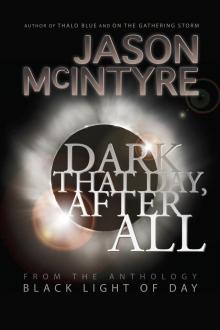 Dark That Day, After All
Dark That Day, After All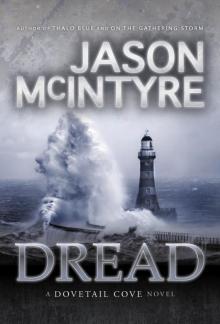 Dread
Dread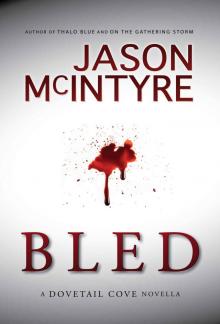 Bled
Bled Instead
Instead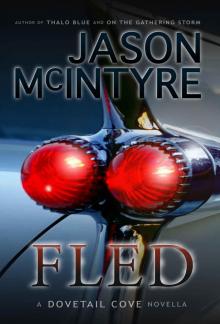 Fled
Fled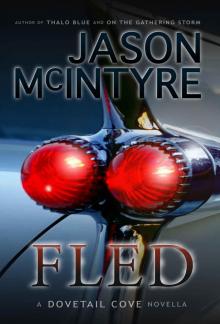 Fled (Dovetail Cove, 1973) (Dovetail Cove Series)
Fled (Dovetail Cove, 1973) (Dovetail Cove Series)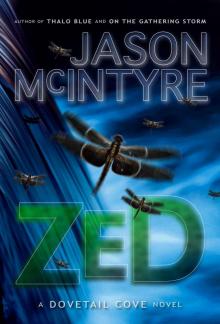 Zed
Zed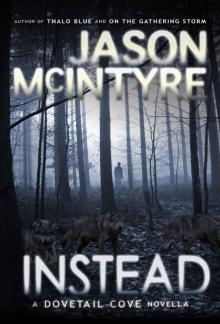 Instead (Dovetail Cove, 1979) (Dovetail Cove Series)
Instead (Dovetail Cove, 1979) (Dovetail Cove Series)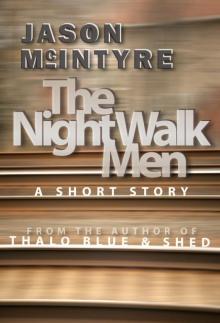 The Night Walk Men
The Night Walk Men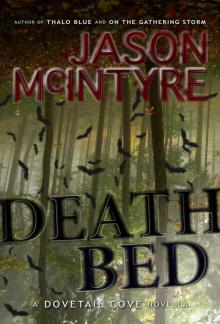 Deathbed (Dovetail Cove, 1971) (Dovetail Cove Series)
Deathbed (Dovetail Cove, 1971) (Dovetail Cove Series)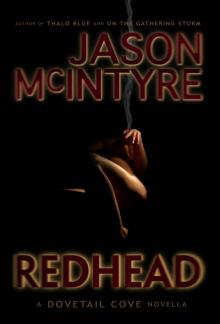 Redhead (Dovetail Cove, 1974) (Dovetail Cove Series)
Redhead (Dovetail Cove, 1974) (Dovetail Cove Series)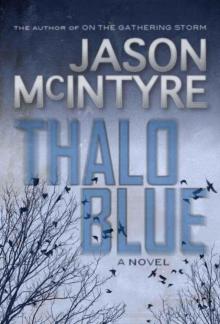 Thalo Blue
Thalo Blue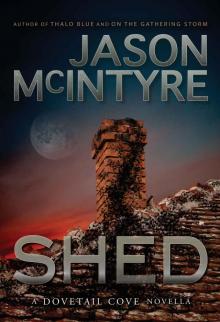 Shed
Shed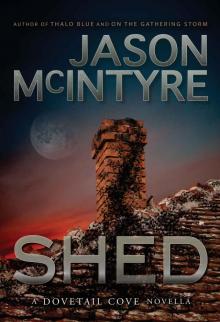 Shed (Dovetail Cove, 1977) (Dovetail Cove Series)
Shed (Dovetail Cove, 1977) (Dovetail Cove Series)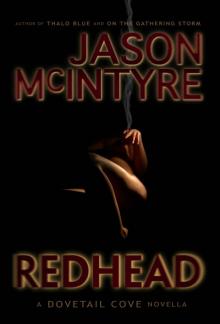 Redhead
Redhead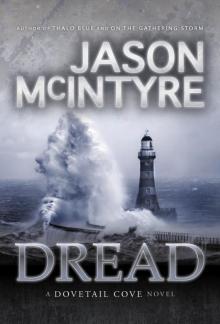 Dread (Dovetail Cove, 1978) (Dovetail Cove Series)
Dread (Dovetail Cove, 1978) (Dovetail Cove Series)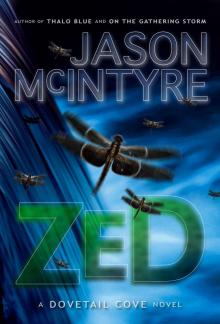 Zed (Dovetail Cove, 1975) (Dovetail Cove Series)
Zed (Dovetail Cove, 1975) (Dovetail Cove Series)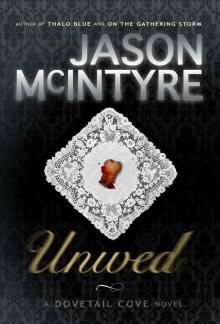 Unwed (Dovetail Cove, 1976) (Dovetail Cove Series)
Unwed (Dovetail Cove, 1976) (Dovetail Cove Series)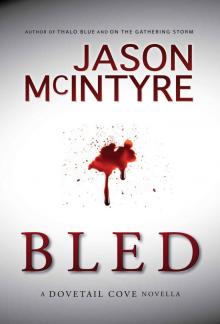 Bled (Dovetail Cove, 1972) (Dovetail Cove Series)
Bled (Dovetail Cove, 1972) (Dovetail Cove Series)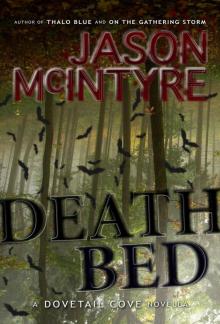 Deathbed
Deathbed